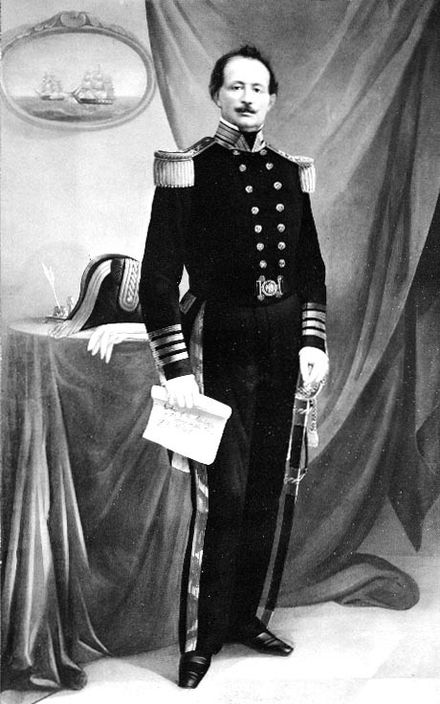
Commodore Levy A Novel of Early America in the Age of Sail By Irving Litvag
 Commodore Levy
Commodore Levy
A Novel of Early America in the Age of Sail
By Irving Litvag
Having read Saving Monticello (reviewed here) by Marc Leepson, this reviewer wanted to know more about Commodore Uriah Phillips Levy, the man who did the saving and the subject of this novel. Novelists are permitted literary license, but Levy’s eventful life required no embellishments and those there are, are mercifully few. Irving Litvag was a former news writer for the CBS Radio Network. He was not a historian. That being said, it is evident that a great deal of research went into this book and that it was a labor of love. The author’s admiration for his subject is as unmistakable as it understandable.
Uriah Phillips Levy’s was born on April 22, 1792, in Philadelphia, PA. His naval career began 10 years later when he ran away from home to become a cabin boy aboard the New Jerusalem. Perhaps that was usual for sea-struck boys in those days. However, Jewish boys from devout families did not usually run away to sign up for two-year stints as cabin boys.
When Levy’s cabin boy service ended, he returned home to study for his Bar Mitzvah. That accomplished, he apprenticed as a seaman for four years to a local ship owner. But President Jefferson’s Embargo Act of 1807 beached the US merchant fleet and Levy. Not until the Non-Intercourse Law of 1809 was the merchant fleet and Levy able to sail. He was promoted to second mate and, at the end of his apprenticeship in 1811, became one-third owner and captain of the schooner George Washington.
The War of 1812 prompted Levy’s Navy enlistment. However, President Jefferson had reduced Army and Navy appropriations and replaced frigates with small ineffective gunboats. That left few berths available for men like Levy. He solved the problem by volunteering aboard the USS Argus and was soon appointed acting lieutenant. When the British captured the Argus, Levy and her crew were imprisoned in the infamous Dartmoor Prison.
Released after two years and his health restored, Levy was assigned as Sailing Master to the USS Franklinin 1816. When Levy retaliated to an anti-Semitic slur made by another officer, he was challenged to a duel. Levy fired into the air while his opponent aimed and missed, but insisted on a second attempt. Levy again fired into the air and his opponent again missed, and still refused to quit the field. Levy was finally forced to kill him. Indicted by a grand jury, Levy was found not guilty and granted his lieutenant commission.
He was assigned to the USS United States but refused entry because Captain William M, Crane and officers did not wish to sail with a Jew. Only when Commodore Charles Stewart refused to rescind the order was Levy admitted. That unhappy service ended in a fight with another officer, court-martial and dismissal from the Navy. After two years of appeals, President James Monroe reversed the sentence and Levy was ordered to sea duty in the Mediterranean as Second Lieutenant on the USS Cyane.
His courage defending an American seaman impressed by the Spanish Navy earned him the offer of captain in the imperial Brazilian Navy. Levy declined saying, “I would rather serve as a cabin boy in the United States Navy than hold the rank of Admiral in any other service in the world.â€
 Upon his return, he awaited assignment but his Navy enemies prevailed and Levy was landlocked. He moved to New York, invested his savings in real estate, and became wealthy enough to commission a full-length statute of Thomas Jefferson and donate it to the people of the United States.
Upon his return, he awaited assignment but his Navy enemies prevailed and Levy was landlocked. He moved to New York, invested his savings in real estate, and became wealthy enough to commission a full-length statute of Thomas Jefferson and donate it to the people of the United States.
Having made a pilgrimage to Monticello, Levy was horrified to find the mansion in decay. He bought the property and vowed to restore it to its former glory. The details of that accomplishment are not in Litvag’s 622-page novel. For that chapter of Levy’s life, interested readers will have to turn to Saving Monticello.
Finally, in 1837, after twenty years as a lieutenant, Levy was promoted to the rank of master commandant. In 1838, the Navy gave him command of the almost derelict USS Vandalia.
He not only restored the ship and its slovenly crew to seaworthiness, he used his ship to demonstrate that discipline could be maintained by replacing flogging with humane disciplinary measures.
His reform was not well received by the Navy old guard. Trumped up charges were brought against him and Levy was again ordered to appear for court-martial. Although the most serious charges were dismissed, the second charge, pertaining to his disciplinary methods, was upheld. Levy was dismissed from the Navy.
Convinced that he was the victim of prejudice and resentment, he set about getting restored to the Navy. How that was accomplished is a great story. Suffice it to say that on May 4, 1844 President John Tyler nominated Levy, “now a Commander, to be a Captain … to fill a vacancy occasioned by the death of Commander E. P. Kennedy.â€
While petitioning the Navy for a ship, Levy wrote persuasive articles and pamphlets against flogging. In 1850, to his great shock, the Board of Naval Officers informed him by letter of his removal from the Navy. He was sure that prejudice had prevailed and appealed to Congress. A court of inquiry was convened. The author quotes many historical figures testifying both for and against Levy and from Levy’s dramatic testimony. That account is worth the price of the book.
The court ruled in Levy’s favor on December 24th, 1857. He was restored to active duty, and given command of the sloop of war Macedonian and ordered to join the Mediterranean squadron. By 1860, he was Flag Officer with the rank of Commodore. He was then 62 years of age. Although neither Litvag’s book nor Levy’s story ends there, by necessity this review does.
That a Jew became a Commodore, the highest rank in the pre-Civil War US Navy, and did so when antisemitism was rife within the service, was itself an unprecedented achievement. Levy made it more so by answering slurs against his faith with reproofs and dueling pistols, by bucking naval tradition to rid the service of flogging, by being courts-martial six times, and by his unyielding determination to fight for redress against injustice. Not the least of his accomplishments is that Congress outlawed flogging in1862. Jefferson’s statue still stands in the Capitol Rotunda.
The author explains Levy’s patriotism and ferocity in the face of bigotry by his lineage. He was a descendent of Sephardic Jews who, having escaped the Spanish Inquisition, made their way to the only nation that offered them life without discrimination. Litvag traces Levy’s unfailing admiration for Jefferson to the same source. Before Jefferson wrote the Declaration of Independence he was the author of the Virginia Statute for Religious Freedom, forerunner of the First Amendment.
This is a many-faceted book whose reach exceeds its genre. In addition to acquainting readers with an extraordinary man, Litvag conveys in fascinating detail what shipboard life was like in the age of sail. Further, because Thomas Jefferson’s policies intersected Levy’s life, readers get a kind of “you are there†account of their devastating effects on the economy, on naval preparedness and on men like Levy, whose careers and livelihoods depended upon going down to the sea in ships.

 The posts are coming!
The posts are coming!


2 comments
I am so delighted that you chose to review Commodore Levy by Irving Litvag. It is, as you say, “a many faceted book whose reach exceeds its genre.” For me it was an eye opener and I remain still in wonder of Levy’s remarkable life.
[Reply]
I am so glad you enjoyed the book. I became interested in the remarkable Levy when I read “Saving Monticello” (reviewed here) which provides a more detailed account of how he saved Jefferson’s home. You might enjoy that book, too. Thanks for commenting.
[Reply]
Leave a Comment